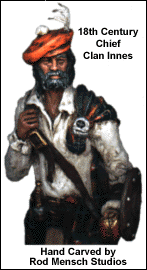
|
Part One: The Cause and Effects
In the 1700's there were two distinct societies in Scotland. In the lowlands, the people were a mixture of all the races that had invaded England and the Isles. Lowlanders spoke a version of English and lived in a society based on the emerging mercantile economy. The Highlanders on the other hand, were largely Celtic in ancestry with a sprinkling of Viking (or Norse) and a few other races. The Highlanders spoke Gaelic, and lived in a largely feudal society based on loyalty and power, not money. The Clan system had been in place for a very long time in the Scottish Highlands. It was the only way of life the Highlanders knew and understood completely. Under the Clan system, the Clan Chief controlled the land and 'leased' out portions to tacksmen, who in turn leased portions to others. The fees or lease for the properties were very small monetarily, as most of the payment was considered in loyalty to the Chief and, therefore, service militarily when the need arose. The more land a Clan Chief had, the larger his army as a very general rule.
Much of the power of the Clan system was broken after the Battle of Culloden. The Clan Chiefs who participated in the 'revolt' were forced to forfeit their lands to the Crown in England. Those who were not killed at Culloden were hunted along with many of their followers. Many escaped to the colonies, while others were captured, killed, jailed and enslaved. Shortly after the defeat at Culloden, laws were passed that totally changed the way of life in the Highlands. These Acts prohibited the wearing of the kilt, the carrying of arms, the teaching of Gaelic and even the playing of the bagpipes. More importantly, one of the acts required that all Clan Chiefs swear fealty to the British King: those who did not were immediately forfeit of their lands. The Act also changed the law of the Highlands, as the Clan Chief no longer had the right to act as judge over the people of his lands. He now became strictly a landlord, without the ability to legally call his tenants into service for any cause. This also removed the ability to help his tenants in their time of need.
Unfortunately for Scotland, many a warrior answered the call, as the temptations to retain ones way of life and be with others of one's kind were in many cases easier to handle than dealing with the changes at home. To their credit, the Highland Regiments were some of the best units in the British Army. But these units paid sacrifices for their service, as they were immediately shipped and used overseas to help in pacifying others to the English cause. Frequently, these units were committed first to the battles and bore the brunt of the fighting. By this means Scotland was now stripped of the remainder of its warriors. The power of the Scottish Clan system was now gone with its warriors. The Clan Chiefs who remained in power were simply landlords, without any real authority in the British legal system. Highland Scotland, almost always penniless, was now toothless as well, and ripe for the plucking. By BW, March 2000 Back to Highland Clearances Main Page Highland Clearances Part One Highland Clearances Part Three Links: The Acts Against Highland Dress
|
Thursday, December 26th, 2019
Attention visitors: Tartans.com is back. Please note that this is a snapshot of the site as it existed nearly 20 years ago and you may encounter broken links; we are still combing through the site and correcting those as we find them. Please also note that some sections are currently not functional, primarily the discussion forums/clan chat boards.
|
** HOME - First Time Visitors - Glossary - - Contact Us ** Awards | Bibliography | Clan Calendar | Clan Chat | Clan Finder | History | Famous Scots | Genealogy | Great Hall of the Clans | Links | News and Features | Scots on the Net | Search | Site Map The Gathering of the Clans
Copyright 1995- Tartans.com - All Rights Reserved. |
 The story of the Highland Clearances and how it destroyed the Highland way of life is one of the most tragic chapters in Scotland's long history. More than two hundred years after the Clearances began, anger and bitterness still rages among descendents of Scottish immigrants who fled, or were imprisoned and enslaved at the peak of the crisis. But like public opinion at the time, the dialogue swings as a pendulum, from one extreme to the other, and in the late 1700's, the Highlanders caught the brunt of this - or rather the edge - like the medieval torture device.
The story of the Highland Clearances and how it destroyed the Highland way of life is one of the most tragic chapters in Scotland's long history. More than two hundred years after the Clearances began, anger and bitterness still rages among descendents of Scottish immigrants who fled, or were imprisoned and enslaved at the peak of the crisis. But like public opinion at the time, the dialogue swings as a pendulum, from one extreme to the other, and in the late 1700's, the Highlanders caught the brunt of this - or rather the edge - like the medieval torture device.


